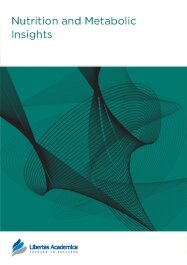

Publication Date: 06 Dec 2011
Type: Original Research
Journal: Nutrition and Metabolic Insights
Citation: Nutrition and Metabolic Insights 2012:5 1-12
doi: 10.4137/NMI.S8568

Background: 1,3-dimethylamylamine (a constituent of geranium), alone and in combination with caffeine, is widely used within dietary supplements. We have recently determined the hemodynamic effects of 1,3-dimethylamylamine and caffeine alone and in combination, using a single ingestion study. However, no study has determined the hemodynamic effects of these ingredients following chronic use. Moreover, no study has determined the effects of these ingredients on bloodborne variables related to health and safety. Therefore, the purpose of this investigation was to assess the hemodynamic and hematologic profile of two different dietary supplements containing 1,3-dimethylamylamine and caffeine (in addition to other ingredients), before and after two weeks of daily intake.
Methods: 7 men (24.9 ± 4.2 yrs) ingested the dietary supplement Jack3d™, while 4 men and 2 women (22.5 ± 1.8 yrs) ingested the dietary supplement OxyELITE Pro™ once per day for two weeks. On days 1 and 15, resting heart rate (HR), systolic (SBP), and diastolic (DBP) blood pressure were measured and rate pressure product (RPP) was calculated. Fasting blood samples were analyzed for complete blood counts, comprehensive metabolic panel, and lipid panel. These tests were done prior to ingestion of supplement. On days 1 and 15 following blood collection, subjects ingested the assigned supplement (2 servings) and HR, SBP, DBP, and RPP were recorded at 30, 60, 90, and 120 minutes post-ingestion.
Results: After 14 days of treatment, resting HR, SBP, DBP, and RPP were not increased (P > 0.05). No significant changes were noted in any measured bloodborne variable, with the exception of an increase in fasting blood glucose with ingestion of Jack3d™ (P = 0.02). In response to acute intake of the supplements, HR, DBP, and RPP were not increased statistically (P > 0.05). SBP was increased with OxyELITE Pro™ (P = 0.03), but not with Jack3d™ (P = 0.09). Compared to pre-ingestion and in general, both supplements resulted in an increase in SBP, DBP, and RPP from 5%–15%, with a peak occurring at the 60 or 90 minute post-ingestion time.
Conclusion: Acute ingestion of OxyELITE Pro™, but not Jack3d™, results in an increase in SBP. Chronic intake of two servings per day of OxyELITE Pro™ or Jack3d™ over a 14 day period does not result in an elevation in resting HR, SBP, DBP, or RPP. No significant changes are noted in any measured bloodborne variable following 14 days of ingestion, with the exception of blood glucose with Jack3d™. Longer term intervention studies inclusive of larger sample sizes are needed to extend these findings.
PDF (1.66 MB PDF FORMAT)
RIS citation (ENDNOTE, REFERENCE MANAGER, PROCITE, REFWORKS)
BibTex citation (BIBDESK, LATEX)
XML
PMC HTML


We have had a great experience publishing our paper in Nutrition & Metabolic Insights. The peer review process was rigorous and the journal staff were very helpful with proof processing. We will definitely be submitting future manuscripts to this journal. Keep up the good work!!
Facebook Google+ Twitter
Pinterest Tumblr YouTube